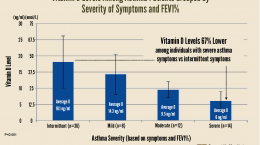Published on February 12, 2025
Dr. Scott Weiss, a Harvard Medical School professor and top biomedical researcher, discusses the benefits of prenatal vitamin D and the importance of study design in vitamin D research and policy decisions
Key Points
- The VDAART trial enrolled pregnant women (10-18 weeks gestation) at high risk for having asthmatic children, randomizing them to receive either 4,400 IU or 400 IU vitamin D daily. Results showed a 20% reduction in childhood asthma, with a p-value of 0.051, just barely missing statistical significance.
- The trial faced three main limitations: insufficient vitamin D dosing (only 75% reached target levels), late pregnancy initiation, and the presence of vitamin D in both control and treatment groups at baseline. When these factors were accounted for through meta-analysis and stratification, the reduction in asthma risk increased to 50%.
- For future trials, Dr. Weiss recommends: enrolling women earlier in pregnancy (4-5 weeks vs. 10-18 weeks), using higher vitamin D doses (6,000-8,000 IU vs. 4,400 IU), and ensuring greater baseline difference between control and treatment groups. He notes VDAART’s results likely apply to general population.
In today’s featured video, Dr. Scott Weiss, M.D. shares a presentation on the important role of prenatal vitamin D in the prevention of asthma and other negative health outcomes in pregnancy and newborns. Following the presentation is an interview with Jen Aliano, Director of GrassrootsHealth, in which they discuss important topics regarding vitamin D research and study design, the challenges faced in prenatal trials, and the concept of considering the totality of evidence when evaluating research for public policy and guidelines.
We hope you enjoy this video!
Watch the Video
Key Topics from the Video
(00:00–01:34) Dr. Scott Weiss, a Harvard Medical School professor and top biomedical researcher, began studying vitamin D’s role in asthma after identifying the vitamin D receptor gene’s link to childhood asthma through genetic and observational studies.
(03:07–04:26) Vitamin D has both endocrine effects (bone health, measured through serum levels) and developmental effects (immune system, organ development, measured in tissue levels). It plays a crucial role throughout pregnancy, from implantation to postnatal immune function.
(04:26–08:49) The VDAART trial enrolled pregnant women (10-18 weeks gestation) at high risk for having asthmatic children, randomizing them to receive either 4,400 IU or 400 IU vitamin D daily. Results showed a 20% reduction in childhood asthma, with a p-value of 0.051, just barely missing statistical significance.
(13:09–15:13) The trial faced three main limitations: insufficient vitamin D dosing (only 75% reached target levels), late pregnancy initiation, and the presence of vitamin D in both control and treatment groups at baseline. When these factors were accounted for through meta-analysis and stratification, the reduction in asthma risk increased to 50%.
(27:32–29:08) Molecular and genetic evidence showed vitamin D influences fetal lung development by increasing sphingolipid levels, which are necessary for airway and immune system development. This provides mechanistic support for the clinical findings.
(31:50–33:14) Vitamin D deficiency during pregnancy may be a significant contributor to health disparities, particularly affecting African-American communities. Current recommendations (600 IU) are far below what experts like Dr. Weiss suggest (6,000 IU minimum).
(34:34–38:16) Pregnancy creates a dramatically increased physiological need for vitamin D, with 5-20 times higher requirements than non-pregnant state, due to fetal development needs and immune system modulation.
(38:57–41:03) Dr. Weiss’s team conducted mouse studies to measure vitamin D levels in various tissues compared to serum levels, as tissue measurements aren’t possible in living humans. This research aims to better understand the relationship between serum and tissue vitamin D levels.
(41:41–44:11) Dr. Weiss advocates for using “totality of evidence” rather than relying solely on randomized controlled trials for medical guidelines. He notes that BMI significantly affects vitamin D’s effectiveness – women with normal BMI at pregnancy start showed better outcomes than obese women.
(46:28–49:22) For future trials, Dr. Weiss recommends: enrolling women earlier in pregnancy (4-5 weeks vs. 10-18 weeks), using higher vitamin D doses (6,000-8,000 IU vs. 4,400 IU), and ensuring greater baseline difference between control and treatment groups. He notes VDAART’s results likely apply to general population.
(50:04–52:54) While a new randomized controlled trial would cost approximately $10-12 million, Dr. Weiss considers this cost-effective given the potential lifetime savings from preventing pregnancy complications and childhood health issues. The main challenge is finding initial funding for such a study.
Vitamin D deficiency is the MOST COMMON medical condition!
When it comes to vitamin D, there’s no one-size-fits-all approach. To achieve and maintain a healthy vitamin D level of at least 40-60 ng/ml, it’s essential to determine your personalized daily dose. This ensures that your body gets the right amount of vitamin D for optimal health, helping support immune function, bone health, and overall wellness.
Are you unsure of your ideal daily vitamin D dose? Our Vitamin D*Calculator is a great tool to get started! By entering a few details along with your current vitamin D levels, you can get a tailored recommendation for your daily dosage.
Learn more about vitamin D and how to apply it to your health, and sign up to receive a short series of free email lessons, here.
About Dr. Weiss
 Dr. Scott Weiss, MD, is a Professor of Medicine at Harvard Medical School, Professor of Environmental Health in the Respiratory Biology Program, and a physician in the Division of Pulmonary and Critical Care Medicine at Brigham Women’s Hospital. He is also the former Scientific Director of Personalized Medicine at Partners HealthCare System and Co-Leader of the Systems Genetics and Genomics Unit and Associate Director of the Channing Division of Network Medicine at Brigham. The research facilities he oversees use state-of-the-art technologies and methods for genetic and genomic research. He co-led a 30-investigator, 110-person research group involved in examining the environmental exposures and genetic risk factors for the development of asthma and COPD, and has led multi-disciplinary cooperative studies of asthma and COPD with international experience.
Dr. Scott Weiss, MD, is a Professor of Medicine at Harvard Medical School, Professor of Environmental Health in the Respiratory Biology Program, and a physician in the Division of Pulmonary and Critical Care Medicine at Brigham Women’s Hospital. He is also the former Scientific Director of Personalized Medicine at Partners HealthCare System and Co-Leader of the Systems Genetics and Genomics Unit and Associate Director of the Channing Division of Network Medicine at Brigham. The research facilities he oversees use state-of-the-art technologies and methods for genetic and genomic research. He co-led a 30-investigator, 110-person research group involved in examining the environmental exposures and genetic risk factors for the development of asthma and COPD, and has led multi-disciplinary cooperative studies of asthma and COPD with international experience.
Dr. Weiss has authored or co-authored over 600 papers and co-written and co-edited 4 books, including a comprehensive textbook on Respiratory Genetics. He has received many honors and awards, including the American Thoracic Society Recognition Award for Scientific Accomplishments “Reduced Vitamin D Levels in Pregnant Women are the Cause of the Asthma Epidemic” and was recently identified as part of the top 0.004% of biomedical researchers in terms of the scientific impact of their work.
His long-standing research interests have been in the area of environmental and genetic risk factors for the development of asthma and COPD and now include pharmacogenetics/pharmacogenomics of airway disease, the fetal and natural development of asthma, the role of vitamin D supplementation during the prenatal period on various outcomes, personalized medicine and the development and application of new technologies into clinical practice.
How Are Your Levels of Vitamin D and Other Important Nutrients?
Check your vitamin D, omega-3s, magnesium, and other important markers today as part of the vitamin D*action project!
Measure your:
- Vitamin D
- Magnesium PLUS Elements (including zinc, copper, selenium, mercury, cadmium and lead)
- Omega-3 Fatty Acids
- hsCRP (for Inflammation)
- HbA1c (for Blood Sugar)
- and more
Did you know that each of the above can be measured at home using a simple blood spot test? As part of our ongoing research project, you can order your home blood spot test kit to get your levels, followed by education and steps to take to help you reach your optimal target levels. Start by enrolling and ordering your kit to measure each of the above important markers, and make sure you are getting enough of each to support better health and wellbeing!
Start Here to Measure Your Levels






